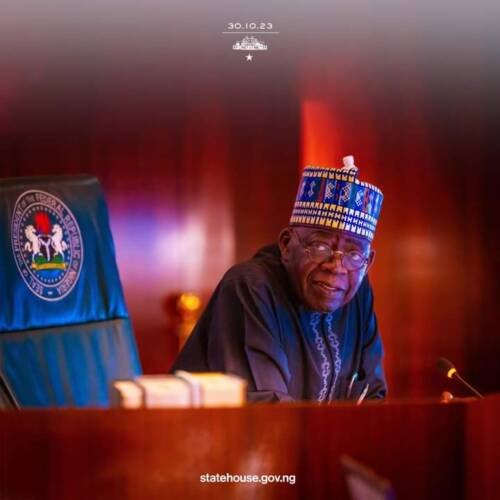President Bola Tinubu has said that the 2024 budgetary allocations and directives would set Nigeria on a transformative path towards a sustainable development.
He urged the National Assembly to ensure that only projects and programs which are in line with the sectoral mandates of the Ministries, Departments and Agencies (MDAs) are passed in the 2024 budget.
The President gave the assurance while presenting the 2024 budget tagged: “Budget of Renewed Hope” before the joint session of the National Assembly.
He commended the National Assembly for the swift consideration and passage of the 2023 Supplementary Appropriation Bills and the 2024-2026 Medium Term Expenditure Framework and Fiscal Strategy Paper.
The president noted that their prompt action underscores their devotion to the economic development and to the greater welfare of the people.
He noted that it further highlights the legislative arm’s desire to work in close collaboration with the Executive branch.
Tinubu, however, expressed confidence that the National Assembly would continue to work closely with the executive to ensure that deliberations on the 2024 Budget are thorough but also concluded with reasonable dispatch.
He said: “I am confident that these budgetary allocations and directives will set Nigeria on a transformative path towards a sustainable and resilient energy future, fostering economic growth, job creation, and environmental preservation.”
The President lamented that economic conditions remain challenging both abroad and at home.
He said despite lingering Post-Covid supply and production bottlenecks, armed conflict in various parts of the world and restrictive monetary policies in major economies, global growth is expected to hover around 3.0 percent in 2024.
The president noted that this relative low rate has significant implications for the country’s economy due to current reliance on importation.
Tinubu was quick to add that despite the global headwinds, the Nigerian economy has proven resilient, maintaining modest but positive growth over the past twelve months.
He added that inflation has trended upward due to weak global conditions, adding that to contain the rising domestic prices, the federal government would ensure effective coordination of fiscal and monetary policy measures, and collaborate with sub-national governments to address structural factors driving inflation in Nigeria.
The President stressed that the 2024 Budget proposal meets his government goal of completing critical infrastructure projects which would help address structural problems in the economy by lowering the costs of doing business for companies and the cost of living for the average person.
Reflecting on the 2023 budget performance, he said an aggregate revenue of N11.045 trillion was projected to fund the 2023 Budget of N24.82 trillion with a deficit of about 6.1 percent of GDP.
Tinubu explained that as of September 30, the federal government’s actual aggregate revenue inflow was N8.65 trillion, approximately 96 percent of the targeted 8.28 trillion.
He stressed that the proposed budget sought to achieve job-rich economic growth, macro-economic stability, a better investment environment, enhanced human capital development, as well as poverty reduction and greater access to social security.
The President revealed that defence and internal security are accorded top priority, adding that the internal security architecture would be overhauled to enhance law enforcement capabilities and safeguard lives, property and investments across the country.
He added that to address long-standing issues in the education sector, a more sustainable model of funding tertiary education would be implemented, including the Student Loan Scheme scheduled to become operational by January 2024.
According to him, We expect the economy to grow by a minimum of 3.76 percent, above the forecasted world average. Inflation is expected to moderate to 21.4 percent in 2024.
Tinubu further explained that the revised 2024-2026 Medium Term Expenditure Framework (MTEF) and Fiscal Strategy Paper (FSP) sets out the parameters for the 2024 Budget.
He noted that after a careful review of developments in the world oil market and domestic conditions, the government has adopted a conservative oil price benchmark of $77.96 per barrel and daily oil production estimate of 1.78 million barrels per day.
The president said they have also adopted a Naira to US Dollar exchange rate of 750 naira per US Dollar for 2024.
Accordingly, he stressed that an aggregate expenditure of N27.5 trillion is proposed for the federal government in 2024, of which the non-debt recurrent expenditure is N9.92 trillion, while debt service is projected to be N8.25 trillion and capital expenditure is N8.7 trillion.
The President said Nigeria remained committed to meeting its debt obligations, adding that projected debt service was 45 percent of the expected total revenue; while the budget deficit was projected at N9.18 trillion in 2024 or 3.88 percent of GDP.
He said this was lower than the N13.78 trillion deficit recorded in 2023 which represents 6.11 percent of GDP.
The President stated; “The deficit will be financed by new borrowings totalling N7.83 trillion, N298.49 billion from Privatisation Proceeds and N1.05 trillion drawdown on multilateral and bilateral loans secured for specific development projects.”
He assured that his government remained committed to broad-based and shared economic prosperity, adding that they are reviewing social investment programmes to enhance their implementation and effectiveness.
The President stressed: “We are currently reviewing our tax and fiscal policies. Our target is to increase the ratio of revenue to GDP from less than 10 percent currently to 18 percent within the term of this Administration. Government will make efforts to further contain financial leakages through effective implementation of key public financial management reforms.
“As you consider the 2024 Budget estimates, we trust that the legislative review process will be conducted with a view to sustaining our desired return to a predictable January-December fiscal year.
“I have no doubt that you will be guided by the interest of all Nigerians. We must ensure that only projects and programs with equitable benefits are allowed into the 2024 Budget. Additionally, only projects and programs which are in line with the sectoral mandates of MDAs and which are capable of realising the vision of our Government should be included in the budget.”

